China’s most successful tournament in eleven years came to an end at the hands of Australia, but there is plenty to be optimistic about. Here, we take a look at the performances of each player who took the field and look to their future in the international set-up. (All statistics courtesy of the AFC official website)
Goalkeepers
Wang Dalei – Appearances 4 (4), Minutes Played 360, Saves 13, Penalty Saves 1 – Rating 9/10
This was a breakout tournament for Wang who did very little wrong and is well on the way to becoming a national hero following his penalty save against Saudi Arabia and a string of excellent saves against Australia. His Man of the Match award in the opening game against the Saudis was perhaps a little unjustified as Hazizi’s poor spot kick was his side’s only shot on target, but there’s no doubt the effect the penalty save had in galvanizing the team.
The Shandong Luneng keeper showed good concentration against Uzbekistan and North Korea by coming up with saves late on, having not been tested for most of the game, and he could not be faulted for either of the goals. In the quarter-finals, it took two Tim Cahill moments of magic to beat Wang who went on to make seven saves in the game in order to keep the scoreline respectable.
All this has been punctuated by his excellent distribution throughout the tournament which, against Saudi Arabia in particular, may have led to some dangerous counterattacks if the forwards had shown better ball control. Often when a goalkeeper is a team’s highest ranked player it suggests the team performed poorly as a whole but, in this case, it’s simply that Wang played so well it is impossible to rank anyone higher than him.
Coming into the competition there was still uncertainty over whether Wang would get the nod over the more internationally experienced Zeng Cheng but there is no doubt now that the former Shanghai Shenhua stopper will be China’s number one going forward. If he maintains this kind of level, it’s not beyond the realms of possibility that a move to Europe may also be in Wang’s future.
Defenders
Zhang Linpeng – Appearances 4 (4), Minutes Played 352, Clearances 22, Pass Accuracy 94% – Rating 8/10
Expectations were high coming into the tournament and, on the whole, Zhang didn’t disappoint. The man Marcello Lippi famously compared to Sergio Ramos was rock solid against Saudi Arabia and Uzbekistan while anchoring an inexperienced backline. An hour long comfortable performance against North Korea followed, before the team’s minds appeared to drift towards the impending quarter-final and the defending, Zhang’s included, began to look a little ragged.
The aforementioned last eight clash with Australia was Zhang’s opportunity to demonstrate his attributes against a higher level of opposition, and he largely held his own until the pressure became overwhelming for a period in the second half. Late in the game, the Guangzhou Evergrande defender showed a lack of concentration when he carelessly gave the ball away around the edge of his own box but, as his passing statistics show, his distribution was generally top class.
Overall, a solid tournament for Zhang who, at just 25, has become the veteran leader of a young defensive unit which acquitted itself very well. Not sure he quite did enough to entice would-be suitors for his much touted move to Europe, but he certainly did nothing to put them off either.
Jiang Zhipeng – Appearances 4 (2), Minutes Played 236, Crosses 8, Assists 1 – Rating 7/10
Although Jiang is a defender, it were his attacking credentials as left back that got him into the squad and this was evident in both his overall performance and when Perrin chose to field him. The Guangzhou R&F man left out of the starting line-ups against Saudi Arabia and Australia when the Frenchman wanted to sure up the left side of the defense. However, when he was included from the start, Jiang was a menace down the flank and was directly involved in two of China’s five goals.
The first was against Uzbekistan when his deep cross led to Wu Xi’s equalizer via touches from Wu Lei and Gao Lin; and the second was a decent ball whipped in behind the North Korean backline and headed in by Sun Ke. Defensively, Jiang did not look assured and he particularly struggled when he came on as a half time substitute for the injured Mei Fang against Australia. He did produce a wicked shot that forced Mat Ryan into a good save, but he found it hard to prevent the hold the Socceroos at bay, while playing a few sloppy passes in his own half.
Against teams that China will be expected to attack Jiang will continue to be the first choice left back but, until he improves defensively, he is likely to continue to find himself left out of games against continental and international heavyweights.
Ren Hang – Appearances 3 (3), Minutes Played 270, Clearances 20, Pass Accuracy 91% – Rating 7/10
Having only come into the international reckoning in 2014, Ren became first choice centre back ahead of the likes of Feng Xiaoting and Li Xuepeng despite the fact that he plays as a left wing-back for Jiangsu Sainty. Considering his inexperience in the role, Ren performed well aside from a few notable errors.
He conceded a penalty for a desperate challenge on Hazizi after he and Zhang Chengdong allowed the Saudi forward to get in between them while chasing a through ball; and he was fortunate not to concede another when his clumsy foul on Uzbek playmaker Djeparov was rightly adjudged to be fractionally outside the box. There’s also an argument to say that Ren should have gotten closer to Tim Cahill for his headed second goal but he otherwise performed well under a lot of pressure against the Australians.
Ren was the only Chinese player to receive a suspension at the tournament for getting booked twice, but he only missed the irrelevant North Korea game and otherwise played every minute he was eligible for. He played left back in the first half against Australia and looked very comfortable before Mei fang’s injury forced him to move inside.
Obviously a favourite of Perrin, the big question with Ren is whether he continues in the middle of defense or moves back out to the left. Jiangsu also have a decision to make regarding the 25-year-old’s future as a move into the heart of defense at club level may be beneficial for both team and player.
Mei Fang – Appearances 4 (4), Minutes Played 304, Passing Accuracy 92%, Assists 1 – Rating 7/10
While Mei’s inclusion in the squad wasn’t much of a surprise, the absence of Guangzhou Evergrande teammates Feng Xiaoting and Li Xuepeng meant that the Wuhan native played a more prominent role in the defense than many would have expected and performed competently, if not spectacularly. Perrin made the strange decision to start the right footer at left back in the first game, where he did fine defensively but clearly struggled to distribute the ball with his left foot and so slowed down several attacks.
Started the next game at right back or third centre back in a fluid 4-5-1/5-4-1 formation and performed much better on both sides of the ball. Back at centre back, his first minute speculative cross field ball against North Korea benefitted from some Laurel and Hardy style defending to result in an assist for Sun Ke’s goal. Mei continued at centre back against Australia where he performed well until half time when a substitution because of injury ended his tournament.
At 25, he’s the same age as Zhang Linpeng but, unlike his more renowned teammate, has only been involved in top flight football for two years. His rapid progression has surprised many and, should it continue, he ought t0 be a prominent figure in the upcoming World Cup qualifiers.
Zhang Chengdong – Appearances 4 (4), Minutes Played 331, Crosses 15, Successful Crosses 0 – Rating 6.5/10
Zhang is probably the Chinese team’s best athlete and is undoubtedly a hard-working, physical player. However, this tournament has illustrated that his game remains unpolished both in attack and defense. Although he normally plays on the right wing for Beijing Guo’an, Zhang featured at right back in every match except the Uzbekistan game where he was a right midfielder who would also drop back to flank a back five.
As has come to be expected from Zhang, his running up and down the touchline was tireless and he was able to fire in almost twice as many crosses as any other teammate. Unfortunately, the 25-year-old failed to hit the mark with any of them demonstrating his general lack of end product.
His effort levels meant that he rarely failed to get back and cover, but the quality of his defensive work was not always up to standard. That was particularly evident in the first game when, along with Ren Hang, he was at fault for letting Hazizi get through to win the penalty and he was withdrawn later in the second half when it became clear that most of Saudi Arabia’s best attacks were coming down the left.
He did quite well in helping stifle the dangerous Uzbekistan left flank of Djeparov and Denisov while playing in a more flexible role, but he struggled in the second half against Australia where Tim Cahill’s second goal came from a cross on Zhang’s flank.
Zhang’s physical attributes mean that he is a valuable player in the squad, but he’ll need to tidy up other aspects of his game in order to move up to the next level. There are rumours of an impending move to La Liga and, should that happen, the player who has already spent much of his career in Portugal and Germany may be able to take the next step.
Li Ang – Appearances 1 (0), Minutes Played 8 – Rating N/A
As expected, Li’s participation was extremely limited with just eight minutes as Zhang Linpeng’s replacement against North Korea. He entered the game during a period when China’s defending was disorganized under great North Korean pressure and was unable to positively influence the situation.
However, for the 21-year-old, this trip to Australia was never meant to include much playing time. Rather, the aim was to give the youngster more experience in preparation for upcoming Olympic and World Cup qualifying campaigns. In that sense, we will only know if he had a successful tournament further down the line.
Midfielders
Zheng Zhi – Appearances 4 (4), Minutes Played 323, Total passes 200, Assists 1 – Rating 8/10
As a captain who is five years older than anyone else in the squad. Zheng was always going to play a key role in how well China performed and the fact that Guozu did better than anyone really expected is an indication of the kind of tournament Zheng had. As the primary holding midfielder, Zheng had excellent games against both Saudi Arabia and Uzbekistan and his pass to Sun Ke set up China’s winning goal against the latter (although most of the credit must go to Sun for what was an excellent solo effort).
It was a surprise to some that Zheng started the North Korea game considering his advancing age and the games overall irrelevance, but he played over 50 minute before a back injury forced him off. While other factors may have been at play, evidence of Zheng’s important to the overall organization of the team can be found in the fact that they became a bit of defensive shamble not long after he was withdrawn.
Unfortunately, the tournament ended on a bit of a low note for the Guangzhou Evergrande captain as he failed to stamp his authority on China’s biggest game since the 2004 Asian Cup final in which he was also involved. It’s not that Zheng performed poorly, but he failed to have the kind of influence on proceedings one might have hoped and, although it wasn’t his fault, he will be disappointed that he had been grounded by a clash of heads when he should have been marking Tim Cahill or Australia’s first goal.
Of course, fatigue may have been a factor in Zheng’s quarter-final performance and the question now surrounding him is whether he continues playing in a joint World Cup and Asian Cup qualifying competition for tournaments that won’t take place until he is 37 and 38, respectively. There is no doubt that his continued presence in the side will be welcomed by Perrin and teammates, but one wonders how much longer Zheng can keep playing at his current level for both club and country.
Wu Xi – Appearances 4 (3), Minutes Played 283, Pass Accuracy 88%, Goals 1 – Rating 7.5/10
It was a tournament of two halves for Wu who played a prominent role in the first two games before being far less effective in the remaining two. Almost scored just before half-time against Saudi Arabia after beating two defenders with nothing but pace and power and he drew the free-kick from which Yu Hai scored with yet another surging run.
His tremendous performance against Uzbekistan was rewarded with both a goal and a deserved Man of the Match award, and Wu’s only real downside over those two contests was the occasional sloppy pass which gave the ball away in dangerous areas. The 25-year-old as rested against North Korea and his fresh legs failed to have any effect on China’s deteriorating performance when he was introduced with less than 20 minutes to go.
Tactical considerations and a lack of possession mean that Wu’s surging box-to-box forays were heavily restricted against Australia. Without them he was somewhat anonymous and one of the only times you might have been aware that he was on the field was when he was subbed off in the second half.
Overall though, Wu can look back on this tournament as his arrival as an international midfielder. Having only relatively recently converted to the position from right back, the Jiangsu Sainty man’s first two games were enough to show his worth as a midfield engine. He’s still not the finished article, but Wu should continue to improve over the next few years and should be at his peak come the next tournament in 2019.
Sun Ke – Appearances 3 (2), Minutes Played 166, Total Shots 3, Goals 3 – Rating 8/10
Depending on how you look at it, Sun’s rating could be either too high or too low. If you value goals above everything else then Sun, as the only Chinese player to score more than one, should be the highest in the team. But, if you value all round performance, you may point out that the Jiangsu Sainty winger did little in the tournament apart from score those three goals.
After not featuring at all in the first game, the 25-year-old came on as a second-half substitute against Uzbekistan and had, within two minutes, put his side into the lead with a pulsating run followed by a curling 2-yard finish. As a starter against North Korea, Sun took just 44 seconds to get on the score sheet after dispatching a hopeful long ball with a calm finish. It was China’s fastest Asian Cup goal in history and towards the end of the half Sun grabbed his third of the tournament with a header.
Three goals in three shots in less than 90 minutes was a remarkable record, but that is where it stayed. Sun tired badly in the second half against the Koreans before being subbed and made no offensive contributions after starting against Australia. The Jiangsu native helped out his defense by tracking back well in the first half, but again he tired in the second period before being withdrawn.
His 100% conversion rate demonstrates the kind of ruthlessness in front of goal lacking in China’s other players, but it is disappointing that his shot total remained at three for the remainder of the tournament. Another blight against Sun is that he created just one chance for other teammates which is quite a poor return for a winger.
Sun has deservedly gone home to a hero’s welcome, but his overall game will need to improve for him to become a truly top star in the national team. That being said, his three goals were priceless and if he can keep up anything like the same scoring rate in future internationals he’ll be a valuable asset for a team lacking goals from other areas.
Hao Junmin – Appearances 3 (2), Minutes Played 205, Chances Created 9, Passing Accuracy 88% – Rating 7/10
After a two year hiatus, Hao’s international career was resurrected by Alain Perrin late in 2014 and some excellent performances in pre-tournament friendlies suggested that the former Schalke 04 midfielder would reward Perrin with an excellent tournament. However, while Hao didn’t perform badly, he never quite hit the heights of his friendly displays against the likes of New Zealand.
As his passing statistics show, Hao’s distribution remained solid throughout the tournament, but he struggled to have much influence on the opening game against Saudi Arabia. The Shandong Luneng player was left out of the starting line-up for the Uzbekistan game but showed Perrin the error of his ways when he was introduced at the interval and became a major reason for China’s second half come back. Although Hao wasn’t directly involved in any of the goals, his excellent pass to Jiang Zhipeng eventually led to the equalizer.
Hao returned to the starting line-up against North Korea, against whom he played his only full 90 minutes of the tournament, and once again linked up with Jiang Zhipeng in the build up to the second goal. Having created a team leading nine chances throughout the tournament, the Wuhan native will have been disappointed to be left out of the quarter-final entirely, but he did enough in the tournament to justify consideration for future squads.
Yu Hai – Appearances 4 (3), Minutes Played 243, Total Shots 2, Goals 1 – Rating 6.5/10
As a perennial left winger with Guizhou Renhe, Yu had a mixed tournament featuring in three different positions across the pitch and scoring a winning goal in rather fortunate circumstances. The 27-year-old put in a hard working, if largely fruitless, performance as the loan forward against Saudi Arabia before switching out to the left wing in the second half. It was from their that Yu scored via a heavily deflected free kick to beat the Saudi’s and became a hero in the process.
Yu started the second game on the left wing against Uzbekistan where he was largely ineffective before being withdrawn at half time for the far more active Hao Junmin and performed better in the same role against North Korea. Later in that game he was somewhat bizarrely shifted to a central midfield role where he looked completely lost and was left out of the starting line-up for the first time in the quarter-final.
Against the Australians, Yu was introduced for Sun Ke with a little less than 20 minutes to go and actually looked like China’s most dangerous player for about ten minutes before fading out towards the end.
Yu continued to prove himself to be a hardworking player who is physically stronger than his teammates on the wing, but he lacks the thrust and creativity of his positional rivals. His three group stage starts clearly show that Perrin likes him, but with the likes of Sun Ke, Hao Junmin and Yu Hanchao as direct rivals, and the likes of Liu Binbin and Yang Chaosheng coming through, Yu is going to have to do more than just work hard in order to maintain his place in the side.
Ji Xiang – Appearances 2 (2), Minutes Played 180, Total Shots 2, Passing Accuracy 78% – Rating 6/10
A surprise late contender for inclusion in the squad, it looked like Ji had been included in the squad as a right back, but he ended up playing the role of an anonymous, workmanlike utility man in the two games in which he featured.
He started brightly on the right side of midfield against Saudi Arabia before flagging early in the second half as the Saudis made increasing inroads down his flank. Surprisingly, Ji remained on the field and shifted back into the right back slot late in the game where he had a much easier time of it once China took the lead.
The Jiangsu Sainty player was completely uninvolved in the next two games before returning to the starting line-up for China’s biggest game in eleven years against Australia. This time, Ji was fielded on the left side of midfield, and why he did the hard work required of him, he looked generally a little overawed by the occasion and frequently played sloppy passes in the face of Australia’s pressing game.
Nobody expected Ji to set the tournament alight, and Perrin clearly drafted him into the squad for his versatility, but of all the players who were given starts, Ji’s contribution is the least obvious to quantify. That being said, the 24-year-old was winning his second and third caps at the tournament and will continue to improve as he gets more international experience. He definitely has a future as a squad player, but is till someway from being an obvious first choice.
Cai Huikang – Appearances 2 (2), Minutes Played 180, Percentage of Tackles Won 100%, Passing Accuracy 90% – Rating 6.5/10
Cai was put into the squad for one reason only – to protect the back four. The midfielder was not there for his range of passing, creativity or goal scoring ability and he was never required to show any of these.
The Shanghai SIPG youth product didn’t feature at all in the first two games, but started against North Korea in order to allow Wu Xi a well earned rest. Against the Koreans, Cai did fairly well until Zheng Zhi came off early in the second half and the organization of the team began to crumble. Of course, that wasn’t all the 25-year-old’s fault but, without his captain alongside him, he struggled to boss what ought to have been an inferior midfield.
It wasn’t much of a surprise when Cai was given the nod against the Australians when a more defensive approach was required, and Cai played very well in the first half while disrupting opposition attacks and sliding in on anybody near him. As Australia’s attacking became more confident and fluid in the second half, Cai struggled a bit to keep up with the pace and needs to prove he can be a ferocious holding midfielder for 90 minutes, rather than just a majority of the game.
Cai’s role in the team is clearly defined and in the early stages of World Cup qualifying against smaller Asian nations he won’t really be required. However, against stronger countries who are likely to dominate possession, Cai has proven himself to be a useful asset in protecting the defense and, for that reason, is likely to remain involved in the national team set up for the foreseeable future.
Yu Hanchao – Appearances 2 (0), Minutes Played 57, Passing Accuracy 96% – Rating N/A
At 27, this ought to have been a tournament for Yu to shine in. Unfortunatley, China’s relative depth in talent on the wings, the emergence of Sun Ke as a goal scorer extraordinaire and Perrin’s tactical tinkering all conspired to severely limit the Guangzhou Evergrande man’s playing time.
He was introduced as a second half substitute against Saudi Arabia, but Perrin preferred to use Sun Ke in the Uzbekistan game and the latter’s winning goal obviously pushed him to the forefront of the Frenchman’s mind. Yu did make another substitute appearance against North Korea, but that was it for his tournament.
In the brief time that he was on the field, Yu actually passed the ball extraordinarily well, but he failed to ever look especially dangerous. While he’s still a young man, is somewhat of an elder amongst this youthful crop of players and his time in the international arena may be running out. Increased playing time and some strong performances with Guangzhou Evergrande may be needed for Alain Perrin to stick with Yu going forward.
Liu Binbin – Appearances 1 (0), Minutes Played 9 – Rating N/A
Slated as a possible wild card during our pre-tournament look at the squad, Liu was only given nine minutes against Uzbekistan to show what he could do. The pacey winger was almost introduced in the second half against Saudi Arabia until Mei Fang’s injury meant Perrin had to use his final substitution in other areas, and his nine minute cameo against the Uzbeks was largely in a defensive role as China sought to protect their lead.
The 21-year-old didn’t take to the field again, but there will be plenty of time for that in the coming years. Interestingly, Perrin made a point of praising Liu in the Uzbekistan game’s post-match press conference which suggests the Shandong Luneng player will feature heavily in the Frenchman’s future plans. Although, in the short term, Liu’s international focus may be primarily on qualifying for the 2016 Olympics.
Forwards
Wu Lei – Appearances 3 (3), Minutes Played 270, Total Passes 68, Total Shots 3 – Rating 6/10
Wu’s rating may seem a little harsh, but this should have been the tournament when he showed his credentials as a legitimate international star and he came up some way short.
He started the first game in the number 10 role and remained largely invisible throughout the 90 minutes. In the second match against Uzbekistan, Wu once again in the attacking midfield and was more involved in the match while making frustrating choices in the final third. The one bright spot was when he chased down Jiang Zhipeng’s over hit cross to head it back across the box and leading to Wu Xi’s goal. otherwise, there were several occasions where Wu found himself in promising positions before either holding on to the ball too long, picking the wrong pass or forcing a shot from an impossible angle.
He was rested for the entirety of the North Korea game, but returned to the line-up as the lone forward for the quarter-final. The first twenty minutes of that game was probably Wu’s best of the tournament as he used his pace to terrorise Australia’s defenders on the counter attack. However, besides one blocked shot, none of those runs led to anything and there were times when it looked as though Wu was pushed off the ball too easily – either legally or illegally.
As anyone who has seen him in the Super League can attest to, Wu’s talents are there for all to see. However, at 23, he is no longer a young prospect and has to show some more consistency for his country. There is no doubt that Wu’s pace and ability to create something from nothing is what keeps him in the team, but just three shots and not a single chance created for a teammate is a pretty poor return for a star player at a major tournament. At present, Wu remains an automatic first choice, but one wonders how long that will last if he doesn’t start to show Guozu some return on his potential.
Gao Lin – Appearances 2 (2), Minutes Played 156, Total Shots 2, Fouls Won 4 – Rating 6/10
For a player taking the field as a striker, Gao looked remarkably unlike scoring at the right end for the entire time that he was on the field. After being left out of the first game, the Guangzhou Evergrande forward was brought in for the Uzbekistan contest.
During that game, he did a good job of holding up the ball and became a lightening rod for Uzbek fans, but he showed a distinct lack of composure in and around the penalty area. He came away with an assist for his overhead kick, but the jury is still out over whether that was a moment of genius or a mistimed swipe at glory.
He kept his place in the line-up for the North Korea game, but was even less effective against a poor defensive unit. He ended up with an own goal on his record when a Zhang Linpeng clearance cannoned into his hip, but he can hardly be held responsible for that.
After being left out of the Australia game entirely, one wonders how long Gao’s international future will last. With the depth China has at his club position of winger, he is not needed there and when Perrin needed to grab a goal against Australia he introduced Yang Xu rather than Gao. Simply speaking, as a striker, his international goal scoring record is not good enough and, while he has other attributes, it remains to be seen if his reputation is enough to keep him in the squad. The one thing that Gao has going for him is that there is little competition in the striking role and, for that reason, he is likely to remain in the international frame for the foreseeable future at least.
Yang Xu – Appearances 2 (0), Minutes Played 27, Total Passes 8, Successful Passes 2 – Rating N/A
After scoring a glut of goals in pre-tournament friendlies, Yang found himself marginalized once the competition got going. Two late substitute appearances were all he could muster and his passing stats tell us how impacful they were.
Through sheer dearth of out and out strikers, Yang is likely to remain in and around the international set up for a while. However, he needs the regular playing time in order to progress and a permanent move away from Shandong Luneng is the only way he is likely to achieve that.
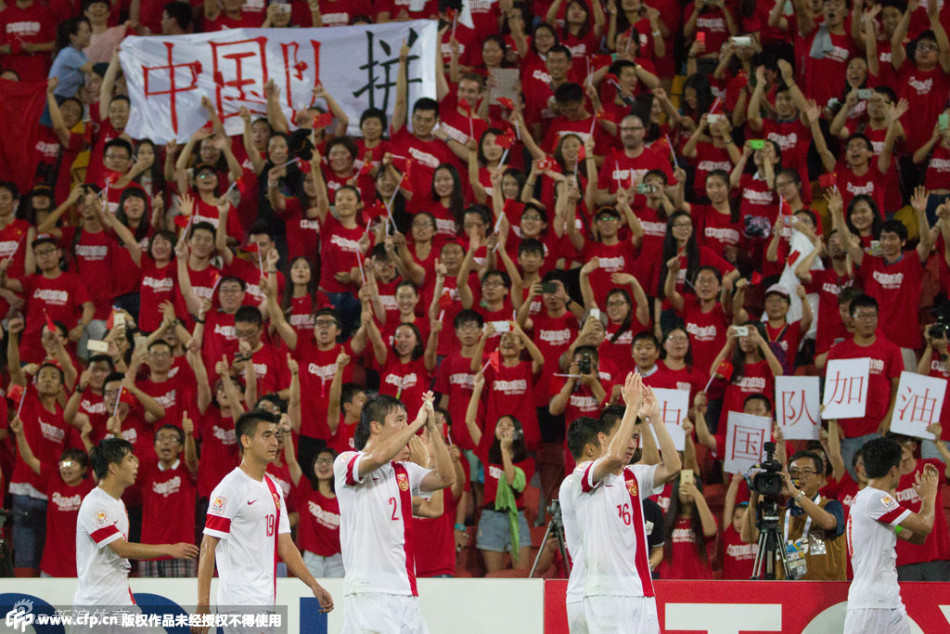
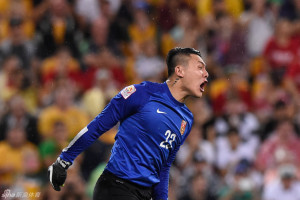
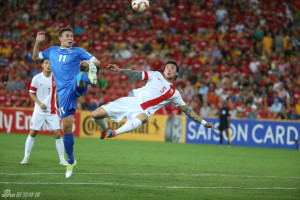
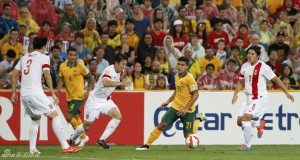
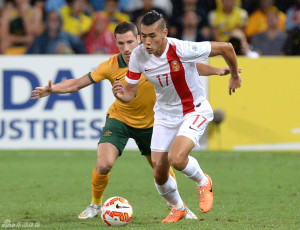
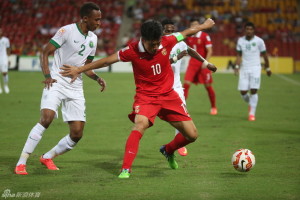
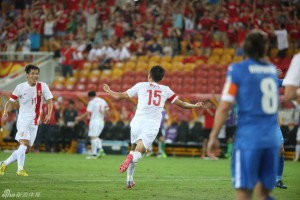
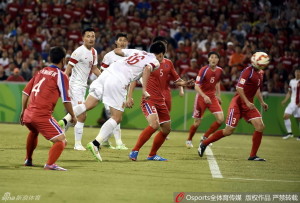
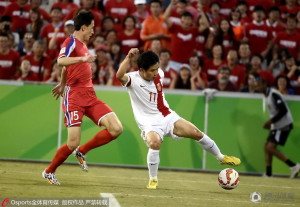
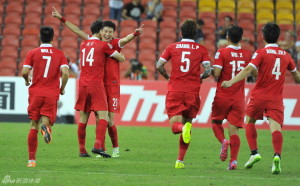
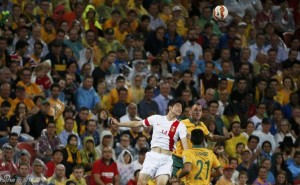
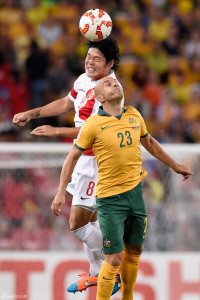
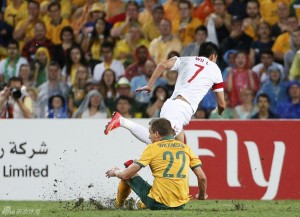
Not sure where to put this but it is a good article and references Tom Byers.
http://www.theguardian.com/football/blog/2015/feb/05/football-in-asia-improving-but-still-trailing-far-behind-africa
Of course this is of no surprise to WEF!
Tom is very skilled in not only teaching football but in spreading the good word. Some very good points made in there thanks for the link.